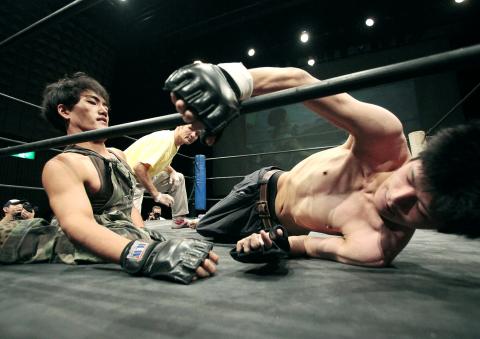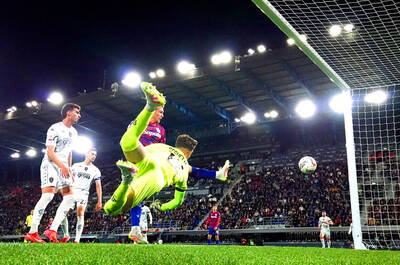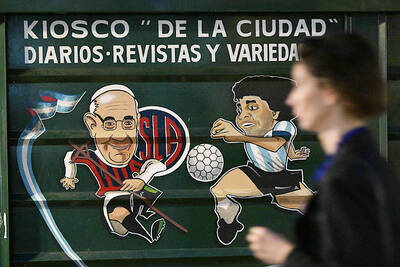With his sleek sunglasses and camouflage pants, Japanese wrestler Makoto Tsuruzono gives off an air of invincibility as he tries to goad his opponent into attacking him.
When the bell rings and the match begins, the unfortunate “Chest Man” can do little but try to fend off the blows raining down on him from Tsuruzono’s muscular arms.
Both men are in wheelchairs, but see their disability as no bar to life as wrestlers.

Photo: AFP
“I can say with pride that no one can defeat me in the ring of handicapped pro-wrestling. I have the confidence in myself,” a victorious Tsuruzono, 34, said as he sat in his wheelchair. “You can live with pride if you feel you are second to none when doing something, no matter how trivial it is.”
Tsuruzono and “Chest Man” were two of the 18 wrestlers — men and women with and without disability — taking part in a WWF-style event in Tokyo organized by handicapped wrestling group Doglegs. The competition attracts contenders with a variety of challenges, ranging from psychological problems, to those such as Tsuruzono, whose left leg was amputated and whose right is withered.
One of the bouts pitted “The Blind Giant” against a profoundly deaf opponent.
Others featured a man with chronic depression and an alcoholic, as well as a number of confrontations between people with varying levels of paralysis. Organizer Yukinori Kitajima said he has faced opposition over the twice-yearly bouts since he started them 20 years ago.
“We have received calls of complaint in the past, with some people saying a show like this was unpleasant and that they didn’t want to see the handicapped around in public,” he said.
The able-bodied Kitajima, who used to work as a care giver, strongly objects to how the handicapped are treated in Japan.
“The Japanese traditionally tend to treat the mentally or physically disabled as something that should be kept out of sight, but they have their own desires,” he said.
“They want to make money and date girls, living freely just like their peers,” he said. “They aren’t tame sheep. Do you think they are happy just living life on welfare from the state? I want to help change society by showing disabled people doing something like this and fighting in the ring.”
And for some first time spectators, watching half-paralyzed men and women punching and kicking each other really did change their opinions.
Takatsugu Suzuki, one of about 200 spectators at the bout in western Tokyo, said he had mixed feelings about the fights.
“We are physically and mentally able, but sometimes feel compelled to hold ourselves back at work or in our everyday lives,” the 38-year-old business school student said. “They fight with real energy, which I suppose is a way of communicating how they feel. I felt encouraged by watching it.”
He said it was uncomfortable to watch a man with a dislocated neck, but also inspiring.
The match, in the “miracle heavy class” division, was fought by a man whose neck was supported by a brace and a 36-year-old woman with partly paralyzed legs and arms. Medical staff stood by at the ring side.
Yasuyuki Kaneshige, 31, a loyal Doglegs fan who has been wheelchair bound since childhood, said he enjoyed the wrestlers’ powerful performances.
“I think this is a great way for the handicapped to express themselves openly in public,” he said. “I might think about getting in the ring myself.”
Kitajima said he was aware that the Doglegs might look like a freak show to some people.
However, he stressed: “The wrestlers are all volunteers.”
Koji Onoue, director-general of the Japanese chapter of the Disabled People’s International, said he is fully behind disabled wrestling “because it shakes up stereotypes.”
“The handicapped once lived in corners of hospitals or care homes, but many now feel confident enough to come out into society and face new challenges,” he said. “They should not feel they have to hide their bodies or be ashamed.”
Masako Yano, 63, said at first it had been tough to see her disabled son, Shintaro, in the ring.
“But once I started watching it, I found myself being entertained,” she said, adding that she had always felt uneasy about how Japanese people treat the disabled as if they are untouchable.
As she sipped a beer with her son following his unsuccessful bout against Kitajima, she admitted to being frustrated when he loses.
However, she is also fiercely proud of him.
“My son is never the same as the healthy ones because he has many disadvantages and inconveniences, but in the ring, he can stand as an equal to his rival,” she said.

Bologna on Thursday advanced past Empoli to reach their first Coppa Italia final in more than half a century. Thijs Dallinga’s 87th-minute header earned Bologna a 2-1 win and his side advanced 5-1 on aggregate. Giovanni Fabbian opened the scoring for Bologna with a header seven minutes in. Then Viktor Kovalenko equalized for Empoli in the 30th minute by turning in a rebound to finish off a counterattack. Bologna won the first leg 3-0. In the May 14 final in Rome, Bologna are to face AC Milan, who eliminated city rivals Inter 4-1 on aggregate following a 3-0 win on Wednesday. Bologna last reached the

If the Wild finally break through and win their first playoff series in a decade, Minnesota’s top line likely will be the reason. They were all over the Golden Knights through the first two games of their NHL Western Conference quarter-finals series, which was 1-1 going back to Minnesota for Game 3 today. The Wild tied the series with a 5-2 win on Tuesday. Matt Boldy had three goals and an assist in the first two games, while Kirill Kaprizov produced two goals and three assists. Joel Eriksson Ek, who centers the line, has yet to get on the scoresheet. “I think the biggest

From a commemorative jersey to a stadium in his name, Argentine soccer organizers are planning a slew of tributes to their late “Captain” Pope Francis, eulogized as the ultimate team player. Tributes to the Argentine pontiff, a lifelong lover of the game, who died on Monday at the age of 88, have been peppered with soccer metaphors in his homeland. “Francisco. What a player,” the Argentine Football Federation (AFA) said, describing the first pope from Latin America and the southern hemisphere as a generational talent who “never hogged the ball” and who showed the world “the importance of having an Argentine captain,

Noelvi Marte on Sunday had seven RBIs and hit his first career grand slam with a drive off infielder Jorge Mateo, while Austin Wynn had a career-high six RBIs as the Cincinnati Reds scored their most runs in 26 years in a 24-2 rout of the Baltimore Orioles. Marte finished with five hits, including his eighth-inning homer off Mateo. Wynn hit a three-run homer in the ninth off catcher Gary Sanchez. Cincinnati scored its most runs since a 24-12 win against the Colorado Rockies on May 19, 1999, and finished with 25 hits. Baltimore allowed its most runs since a 30-3 loss to